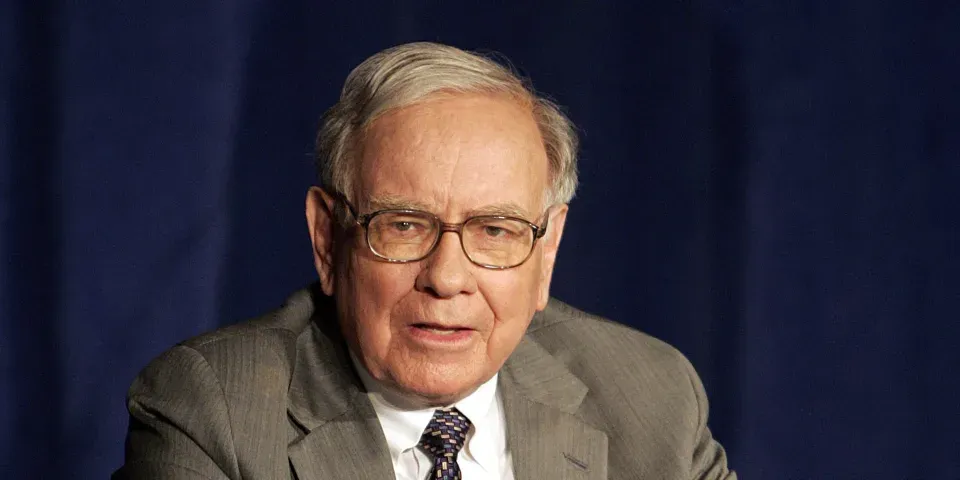Warren Buffett fears AI expresses deep concerns about AI, calling it a potential danger. Learn why the investing legend is worried.
Introduction: Warren Buffett fears AI
Warren Buffett fears AI has expressed significant concerns about the potential misuse of artificial intelligence (AI), particularly highlighting its capacity to enhance scams and fraudulent activities. During Berkshire Hathaway’s annual shareholder meeting, Buffett pointed out the dual nature of AI, acknowledging its potential for both tremendous good and harm. He specifically warned about the technology’s ability to create realistic and misleading content, such as deepfakes and voice-cloning, which could be used by scammers to deceive people more effectively than ever before.
Buffett’s apprehension extends to the broader implications of AI on society, drawing a parallel between AI and the atomic bomb in terms of their transformative but potentially destructive power. Despite recognizing the significant advancements and potential benefits of AI, he admitted to not fully understanding the technology. However, he emphasized the importance of being cautious and considerate in harnessing AI’s power, given its potential for harm.
Moreover, Buffett shared a personal anecdote about encountering a deepfake video of himself, which was used by a fraudster to solicit funds, highlighting the convincing nature of AI-generated content3. He also reflected on the historical presence of scams in American society and expressed concern over the increasing sophistication of AI-generated images and videos, making it challenging to discern authentic from fabricated content.
Buffett’s comments underscore a broader debate within the business and technology communities about the ethical use of AI and the need for safeguards against its misuse. Despite his reservations, Buffett also acknowledged AI’s “enormous potential for good,” indicating a nuanced view of the technology’s impact5. His warnings serve as a call to action for both the tech industry and regulators to address the potential risks associated with AI, ensuring that its development and application are guided by ethical considerations and protective measures against misuse.
What are some potential benefits of ai according to warren buffett?
Warren Buffett has acknowledged several potential benefits of artificial intelligence (AI), despite his reservations about its broader implications. Here are some of the key benefits he has highlighted:
- Increased Productivity and Efficiency: Buffett has noted that AI promises to replace workers in certain tasks, leading to increased productivity and efficiency in various industries. This could potentially generate significant economic value.
- Harnessing New Types of Knowledge: AI’s ability to process and analyze vast amounts of data can lead to the discovery and utilization of new types of knowledge, which could be transformative across different fields.
- Economic Value Creation: The integration of AI into businesses and industries is expected to create substantial economic value, potentially leading to wealth creation and economic growth.
- More Leisure Time for People: As AI takes over more routine or labor-intensive tasks, it could free up more time for people to engage in leisure activities or pursue other interests, potentially improving quality of life.
- Integration into Products: Through his investments, Buffett has shown a belief in the integration of AI into products, as seen in companies like Apple and Amazon, which continuously incorporate AI to enhance user experience and functionality.
These benefits highlight Buffett’s nuanced view of AI, recognizing its potential to drive significant positive change, even as he cautions about its risks and the need for careful consideration of its broader impacts.
What are some of the dangers of ai that warren buffett has warned about?
Warren Buffett has expressed several concerns about the dangers of artificial intelligence (AI), emphasizing its potential to cause unintended harm and its irreversible nature. Here are some specific dangers he has highlighted:
- Enhancement of Scams: Buffett has warned that AI could be used to create more convincing scams, such as through the use of deepfakes or voice cloning. This could make it easier for bad actors to deceive people, leading to more effective and potentially harmful scams.
- Unintended Consequences: He has expressed concern about the unintended consequences of AI, drawing a parallel between AI and the atomic bomb. Just as the atomic bomb was developed for a specific purpose but led to long-term global risks, AI could also have unforeseen impacts that might be difficult to control or reverse.
- Irreversibility: Buffett has pointed out that once AI technologies are developed, they cannot be “uninvented.” This irreversibility means that any negative impacts or dangerous capabilities of AI could be permanently out of human control, posing long-term risks.
- Existential Risks: Echoing the concerns of other experts, Buffett has acknowledged that AI could pose existential risks to humanity. This includes the potential for AI to be used in ways that could threaten human survival or significantly alter societal norms in harmful ways.
- Weaponization and Misuse: There is also the fear that AI could be weaponized or used by state and non-state actors to achieve harmful objectives. This could include everything from cyber warfare to the manipulation of political systems, which could have destabilizing effects on a global scale.
Buffett’s warnings about AI reflect a cautious approach to the technology, emphasizing the need for careful consideration of its ethical implications and potential risks to ensure that its development and deployment do not lead to catastrophic outcomes.
How has warren buffett invested in ai?
Warren Buffett has made significant investments in artificial intelligence (AI) through Berkshire Hathaway’s portfolio, which includes substantial stakes in several major companies that are heavily involved in AI development and implementation. Here are some details about his AI investments:
- Apple: Apple is the largest AI investment in Berkshire Hathaway’s portfolio, constituting 44.2% of the total portfolio. Buffett has held onto the stock since 2016, appreciating the company’s integration of AI into its products, such as Siri, facial recognition, and content recommendations. Apple is also prioritizing investments in generative AI.
- Amazon: Amazon, which Buffett began investing in 2019, has more than doubled in value since then. The company is a leader in AI through its cloud computing arm, Amazon Web Services (AWS), which offers a comprehensive portfolio of AI tools and has developed its own data center chips for AI workloads.
- Moody’s: Owned by Berkshire since 2000, Moody’s uses AI to enhance its data analytics capabilities, which is a natural progression for a corporate credit and analytics firm. This investment aligns with Buffett’s traditional investment style while incorporating modern technological advancements.
- Snowflake: Snowflake represents a smaller portion of the portfolio but is notable for its focus on AI and data analytics. Berkshire Hathaway participated in Snowflake’s public offering in 2020, attracted by its innovative cloud platform and AI capabilities.
These investments reflect Buffett’s strategic approach to AI, focusing on companies that integrate AI into their existing successful business models rather than investing solely based on AI technology. This strategy allows him to benefit from the growth potential of AI while maintaining a diversified and robust investment portfolio.

How does warren buffett think ai will impact society in the future?
Warren Buffett has expressed a complex view on the impact of artificial intelligence (AI) on society, highlighting both its potential benefits and significant risks. He acknowledges that AI could bring about substantial positive changes, such as economic efficiencies and advancements in various fields, but he is equally concerned about its potential for harm, particularly in terms of enhancing scams and fraudulent activities.
Buffett has compared the rapid advancement of AI to the development of the atomic bomb, emphasizing the potential for catastrophic consequences if misused. He has expressed concerns about AI’s ability to generate realistic and misleading content, such as deepfakes, which could be exploited by scammers to deceive people more effectively than ever before. This potential for misuse makes him wary of the technology’s broader societal implications.
Despite his reservations, Buffett also sees AI as having “enormous potential for good,” acknowledging its transformative power and the positive impacts it could have on society. However, he remains cautious, emphasizing the need for careful consideration and ethical management to ensure that AI’s development and application do not lead to unintended detrimental outcomes.
Overall, Buffett’s perspective on AI is marked by a recognition of its dual nature—its ability to drive progress and innovation, alongside significant risks that need to be managed with great care.
What are some examples of ai scams that warren buffett has warned about?
Warren Buffett has specifically warned about the use of artificial intelligence (AI) in creating realistic and misleading content that can be used in scams. He has highlighted several examples of AI scams, including:
- Deepfake Videos: Buffett recounted a personal encounter with a deepfake video of himself. This video was used by a fraudster to ask strangers for cash, demonstrating the convincing nature of AI-generated content. He mentioned that the deepfake was so realistic that he quipped, “I practically would have sent money to myself over in some crazy country,” underscoring the potential for such technology to deceive individuals.
- AI Voice-Cloning and Facial-Cloning: Buffett has expressed concerns about advancements in AI voice-cloning, facial-cloning, and deep-fake technology. Scammers use these technologies to create or manipulate videos and images, intending to extort money from unsuspecting individuals. He shared an example of encountering a fake video featuring himself, which was so convincing that it could have fooled close family members.
- Impersonation Scams: The use of AI voice-cloning and deep-fake technology to impersonate family and friends is a growing concern. Scammers can manipulate videos and images to impersonate an individual’s family and friends, tricking them into sending money or disclosing personal information.
Buffett’s warnings about AI scams focus on the technology’s ability to generate highly realistic and misleading content, which can be exploited by scammers to deceive people more effectively than ever before. He has likened the advent of AI to the creation of the atom bomb, emphasizing the potential for both tremendous good and harm, and expressing uncertainty about its impact on society.
How does warren buffett think ai will impact society in the future?
Warren Buffett views the impact of artificial intelligence (AI) on society in the future with a mix of caution and recognition of its potential benefits. He acknowledges that AI holds “enormous potential for good,” such as driving economic efficiencies and technological advancements. However, he is equally concerned about its potential for harm, particularly in how it could be misused.
Buffett has compared the rapid advancement of AI to the development of the atomic bomb, highlighting the potential for catastrophic consequences if misused. He emphasizes that, like the atomic bomb, AI represents a significant leap in human capability that carries both transformative potential and serious risks. His main concern is that the technology could be harnessed to deceive and exploit individuals, pointing out that AI could become the next big ‘growth industry’ for scams, including the creation of deepfakes and AI-generated content used in fraudulent activities.
Despite these concerns, Buffett also sees AI as a transformative force that could make the economy more efficient. However, he warns that this efficiency could lead to significant job disruptions, as AI might enable companies to operate with fewer employees. This dual perspective underscores his cautious approach to AI, advocating for a balanced view that considers both the positive advancements and the potential challenges and ethical implications of the technology.
Conclusion:
In conclusion, Warren Buffett has articulated a cautious stance on the rapid advancement of artificial intelligence, emphasizing its potential to both revolutionize beneficial processes and significantly enhance the capabilities of fraudulent schemes. His comparison of AI to the atomic bomb underscores the profound impact and dual nature of the technology.
While acknowledging the positive potential of AI, Buffett’s personal experiences with deepfakes and his historical perspective on scams highlight the urgent need for ethical guidelines and regulatory measures to prevent misuse. His insights call for a balanced approach to AI development, ensuring that its benefits are maximized while its risks are carefully managed.
